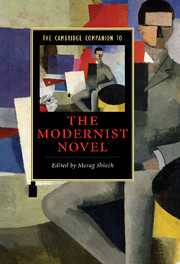Book contents
- Frontmatter
- Reading the modernist novel: an Introduction
- 1 Modernists on the art of fiction
- 2 Early modernism
- 3 Remembrance and tense past
- 4 Consciousness as a stream
- 5 The legacies of modernism
- KEY NOVELISTS
- 6 James Joyce and the languages of modernism
- 7 Tradition and revelation: moments of being in Virginia Woolf’s major novels
- 8 Wyndham Lewis and modernist satire
- 9 D. H. Lawrence: organicism and the modernist novel
- 10 Joseph Conrad’s half-written fictions
- 11 Djuna Barnes: melancholic modernism
- 12 William Faulkner: an impossibly comprehensive expressivity
- 13 Writing lives: Dorothy Richardson, May Sinclair, Gertrude Stein
- 14 C. L. R. James, Claude McKay, Nella Larsen, Jean Toomer the ‘black Atlantic’ and the modernist novel
- 15 Situating Samuel Beckett
- Further reading
- Index
12 - William Faulkner: an impossibly comprehensive expressivity
from KEY NOVELISTS
Published online by Cambridge University Press: 28 July 2007
- Frontmatter
- Reading the modernist novel: an Introduction
- 1 Modernists on the art of fiction
- 2 Early modernism
- 3 Remembrance and tense past
- 4 Consciousness as a stream
- 5 The legacies of modernism
- KEY NOVELISTS
- 6 James Joyce and the languages of modernism
- 7 Tradition and revelation: moments of being in Virginia Woolf’s major novels
- 8 Wyndham Lewis and modernist satire
- 9 D. H. Lawrence: organicism and the modernist novel
- 10 Joseph Conrad’s half-written fictions
- 11 Djuna Barnes: melancholic modernism
- 12 William Faulkner: an impossibly comprehensive expressivity
- 13 Writing lives: Dorothy Richardson, May Sinclair, Gertrude Stein
- 14 C. L. R. James, Claude McKay, Nella Larsen, Jean Toomer the ‘black Atlantic’ and the modernist novel
- 15 Situating Samuel Beckett
- Further reading
- Index
Summary
I went to the dresser and took up the watch, with the face still down. I tapped the crystal on the corner of the dresser and caught the fragments of glass in my hand and put them into the ashtray and twisted the hands off and put them in the tray. The watch ticked on … Father brought back a watch-charm from the Saint Louis Fair to Jason: a tiny opera glass into which you squinted with one eye and saw a skyscraper, a ferris wheel all spidery, Niagara Falls on a pinhead.
William Faulkner, The Sound and the Fury (1929)As regards any specific book, I'm trying primarily to tell a story, in the most effective way I can think of, the most moving, the most exhaustive. But I think even that is incidental to what I am trying to do, taking my output (the course of it) as a whole. I am telling the same story over and over, which is myself and the world … This I think accounts for what people call the obscurity, the involved formless 'style', endless sentences. I'm trying to say it all in one sentence, between one Cap and one period. I'm still trying to put it all, if possible, on one pinhead.
William Faulkner, Letter to Malcolm CowleyBy 1944 the literary critic Malcolm Cowley had been reading the novels of William Faulkner (1897-1962) for some time, and 'gradually and with errors of judgment' he had begun to 'perceive a pattern' in the novels that had largely escaped him on first reading (6). Among the first to describe the emergence of literary modernism in America, Cowley was struck by the inverse relationship between his own growing certainty of the importance of Faulkner’s fiction and what he termed the author’s ‘quoted value on the literary stock exchange’ (as he noted, by ‘the later years of World War II … [Faulkner’s] seventeen books were effectively out of print’), and he decided ‘to write a long essay on Faulkner … to see whether it mightn’t redress the balance between his worth and his reputation’ (5–6).
- Type
- Chapter
- Information
- The Cambridge Companion to the Modernist Novel , pp. 178 - 190Publisher: Cambridge University PressPrint publication year: 2007
- 1
- Cited by



